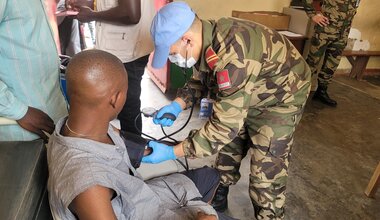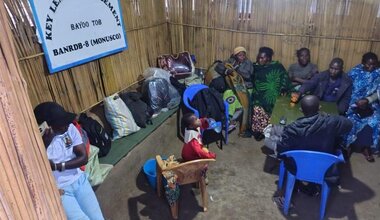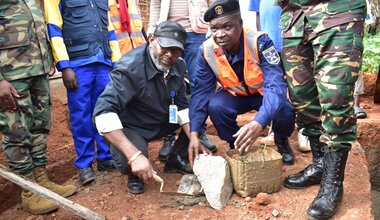ITURI: Congolese Journalists Trained by UN on how to Fight Hate-speech and Promote Peace Rhetoric
To help combat hate speech and promote a better understanding of this phenomenon by media professionals, such was the objective pursued by MONUSCO and the United Nations Joint Human Rights Office (UNJHRO), by organizing this training for twenty journalists last December 18 in Bunia, Ituri province.
The training also focused on the legal framework related to this issue and helped define the role and responsibilities of the media professionals in the fight against speech and messages inciting hatred in the Ituri province.
According to the United Nations Joint Human Rights Office, hate speech and messages inciting hatred are very dangerous for a society, as they trigger conflicts. They convey and legitimize exclusion of some communities and have them stigmatized. They also fuel suspicion and mistrust between communities.
To combat this phenomenon, media outlets have a very important role to play. Pursuant to article 5 of the Congolese Code of Ethics for journalists, the latter must "banish insult, defamation, backbiting, slander, baseless accusations, distortion of facts, lies, incitement to hatred on religious, ethnic, tribal, regional or racial lines, as well as refrain from promoting negative values in the daily practice of their profession”.
This implies journalists must avoid hate speech and avoid being instrumental in disseminating it; they must also avoid unnecessary references to subjects’ identities. They must, however, promote diversity and representativeness for the society, and report any hate speech.
The microphone we hand to people can either help bring peace or cause the country to burn down
Markus Jean Loika is a journalist who works for the online media buniaactualite.com. He says the training was very interesting and very useful for his job in these terms :“The training has helped me to further understand my role as a journalist in the fight against hate speech and messages. It has also enabled me to become more aware of my importance in the fight against this phenomenon in the community and especially in Ituri where such cases are commonplace. As journalists, all of us have made the commitment, as of now, to combat the hate speeches going on in the province. "
Pierrot Saliboko Mangala, Journalist for Radio Merveille in Bunia, also participated in this training.
“The training has helped us to increase our knowledge. As journalists, we are constantly in the field, we interview people, but we often come across these challenges, not knowing what a hate speech or a message inciting hatred means exactly. What we have learned here will help us discharge our duties successfully and avoid lapsing into offenses of incitement to hatred, this being punishable by the Congolese law. Moreover, we will be able to set things right, especially when dealing with topics affecting communities, because the microphone we hand over to people can bring peace or get the country to burn down”, he underscored.
As a reminder, the United Nations defines hate speech as "any type of communication (oral, written, behavioral) constituting an attack or using pejorative or discriminatory language towards a person or a group because of their identity (religion, race, ethnicity, nationality, color of skin, gender, pedigree, etc.”
Finally, it was recalled that the fight against hate speech requires coordinated action to tackle the root causes and the driving forces behind them, as well as the consequences to the victims and the society.
 UN
UN United Nations Peacekeeping
United Nations Peacekeeping






